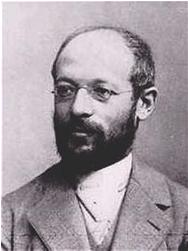Georg Simmel
Georg Simmel (March 1, 1858 – September 28, 1918) was one of the first generation of German sociologists.
Life
Simmel was born in Berlin and lived there most of his life. After the early death of his father a guardian was appointed for him. His studies pioneered the concept of social structure.
Simmel studied philosophy and history at the University of Berlin. In 1881 he received his doctorate for his thesis "The Nature of Matter According to Kant's Physical Monadology". He became a Privatdozent at the University of Berlin in 1885. His lectures were not only popular inside the university, but attracted the intellectual elite of Berlin as well.
Although his applications for vacant chairs at German universities were supported by Max Weber, Simmel remained an academic outsider. Only in 1901 was he elevated to the rank of extraordinary professor (full professor but without a chair; see the German section at Professor). At that time he was well-known throughout Europe and America and was seen as a man of great eminence.
Simmel nevertheless continued his intellectual and academic work, taking part in artistic circles as well as being a cofounder of the German Society for Sociology, together with Max Weber and Ferdinand Toennies. This life at the meeting point of university and society, arts and philosophy was possible because Simmel had been the heir to a fortune from his appointed guardian.
He befriended many well-known men, e.g. Max Weber, Rainer Maria Rilke, Stefan George and Edmund Husserl.
In 1890 he married Gertrud Kinel. A philosopher in her own right, she published under the pseudonym Marie-Luise Enckendorf. They lived a sheltered and bourgeois life, their home becoming a venue for cultivated gatherings in the tradition of the salon. They bore a son, Gertmund, a combination of their names. He was frequently mentioned in Simmel's work.
Only in 1914 did Simmel receive an ordinary professorship with chair, at the then German University of Strasbourg. Because of the outbreak of World War I, all academic activities and lectures were halted as lecture halls were converted to military hospitals. In 1915 he applied - without success - for a chair at the University of Heidelberg.
Shortly before the end of the war in 1918, he died from liver cancer.
Work
Simmel was known as an essayist as well as author of sociological and philosophical books. Some of his major monographic works include:
- On Social Differentiation (1890)
- The Problems of the Philosophy of History (1892-93)
- Introduction to the Science of Ethics (1892-93)
- The Philosophy of Money (1900)
- Sociology: Investigations on the Forms of Sociation (1908)
- Fundamental Questions of Sociology (1917)
- Lebensanschauung (1918)
ReferencesISBN links support NWE through referral fees
External link
Credits
New World Encyclopedia writers and editors rewrote and completed the Wikipedia article in accordance with New World Encyclopedia standards. This article abides by terms of the Creative Commons CC-by-sa 3.0 License (CC-by-sa), which may be used and disseminated with proper attribution. Credit is due under the terms of this license that can reference both the New World Encyclopedia contributors and the selfless volunteer contributors of the Wikimedia Foundation. To cite this article click here for a list of acceptable citing formats.The history of earlier contributions by wikipedians is accessible to researchers here:
The history of this article since it was imported to New World Encyclopedia:
Note: Some restrictions may apply to use of individual images which are separately licensed.
